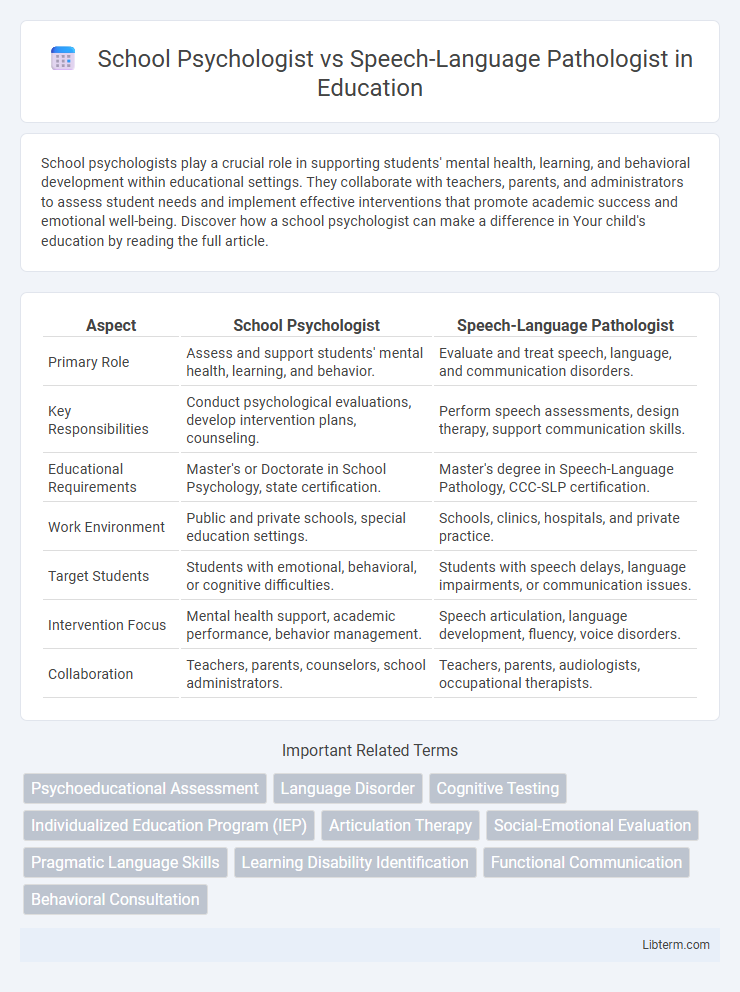School psychologists play a crucial role in supporting students' mental health, learning, and behavioral development within educational settings. They collaborate with teachers, parents, and administrators to assess student needs and implement effective interventions that promote academic success and emotional well-being. Discover how a school psychologist can make a difference in Your child's education by reading the full article.
Table of Comparison
| Aspect | School Psychologist | Speech-Language Pathologist |
|---|---|---|
| Primary Role | Assess and support students' mental health, learning, and behavior. | Evaluate and treat speech, language, and communication disorders. |
| Key Responsibilities | Conduct psychological evaluations, develop intervention plans, counseling. | Perform speech assessments, design therapy, support communication skills. |
| Educational Requirements | Master's or Doctorate in School Psychology, state certification. | Master's degree in Speech-Language Pathology, CCC-SLP certification. |
| Work Environment | Public and private schools, special education settings. | Schools, clinics, hospitals, and private practice. |
| Target Students | Students with emotional, behavioral, or cognitive difficulties. | Students with speech delays, language impairments, or communication issues. |
| Intervention Focus | Mental health support, academic performance, behavior management. | Speech articulation, language development, fluency, voice disorders. |
| Collaboration | Teachers, parents, counselors, school administrators. | Teachers, parents, audiologists, occupational therapists. |
Introduction: Understanding the Roles
School psychologists specialize in assessing and supporting students' emotional, social, and cognitive development, addressing learning difficulties and behavioral issues within the educational environment. Speech-language pathologists focus on diagnosing and treating communication disorders, including speech, language, and swallowing problems, to enhance students' verbal and nonverbal communication skills. Both professionals collaborate with educators and families to create individualized plans that promote student success and well-being.
Educational Background Requirements
School psychologists typically hold a specialist-level degree such as an Ed.S. or a doctoral degree like a Ph.D. or Psy.D., with extensive training in psychology, education, and assessment. Speech-language pathologists must earn a master's degree in speech-language pathology, including courses in anatomy, linguistics, and speech disorders, followed by a supervised clinical fellowship. Both professions require state licensure and national certification, emphasizing specialized education tailored to student development and communication needs.
Core Responsibilities of School Psychologists
School psychologists specialize in assessing and supporting students' mental health, learning, and behavioral challenges through psychological evaluations and individualized interventions. They collaborate with educators, parents, and other professionals to develop strategies that enhance academic performance and emotional well-being. Their core responsibilities include crisis intervention, counseling, and facilitating educational planning based on cognitive and emotional assessments.
Core Responsibilities of Speech-Language Pathologists
Speech-language pathologists (SLPs) specialize in diagnosing and treating communication disorders, including speech, language, voice, and fluency issues. Their core responsibilities include assessing speech and language skills, developing individualized therapy plans, and collaborating with educators and families to support communication development in children and adults. Unlike school psychologists who focus on behavioral and emotional assessments, SLPs directly target improving verbal and nonverbal communication abilities to enhance academic and social performance.
Assessment and Diagnostic Processes
School psychologists specialize in cognitive, emotional, and behavioral assessments to identify learning disabilities, mental health issues, and developmental disorders, using tools like standardized tests, observations, and interviews. Speech-language pathologists conduct speech, language, and communication evaluations, employing articulation tests, language sampling, and fluency assessments to diagnose speech delays, language impairments, and swallowing disorders. Both professionals collaborate in multidisciplinary teams to ensure comprehensive evaluation and individualized intervention planning for students.
Intervention Strategies and Techniques
School psychologists employ cognitive-behavioral interventions, social skills training, and individualized academic support to address emotional, behavioral, and learning difficulties in students. Speech-language pathologists utilize articulation therapy, language enhancement exercises, and fluency shaping techniques to improve communication disorders, including speech delays and language impairments. Both professionals collaborate with educators and families, integrating evidence-based practices to create tailored intervention plans that enhance student development and academic success.
Collaboration with Teachers and Families
School Psychologists and Speech-Language Pathologists collaborate closely with teachers and families to support students' academic and social-emotional development. School Psychologists provide behavioral assessments and intervention strategies, while Speech-Language Pathologists focus on communication disorders and language development. Together, they create integrated plans that address both psychological and speech-related needs, ensuring comprehensive support for student growth.
Impact on Student Academic Success
School psychologists assess and address cognitive, emotional, and behavioral factors that influence academic performance, providing interventions that improve learning outcomes and classroom behavior. Speech-language pathologists specialize in diagnosing and treating communication disorders, enhancing students' language skills critical for reading comprehension and classroom participation. Both professionals collaboratively support student academic success by targeting distinct but interconnected areas essential for effective learning and social interaction.
Career Paths and Work Environments
School psychologists assess and support students' mental health, learning, and behavioral needs primarily within educational settings such as public schools, private schools, and district offices. Speech-language pathologists specialize in diagnosing and treating communication disorders, working in diverse environments including schools, hospitals, rehabilitation centers, and private practices. Both careers require advanced degrees and certifications but differ in their focus, with school psychologists concentrating on emotional and cognitive development, while speech-language pathologists target speech, language, and swallowing functions.
Choosing the Right Professional for Student Needs
Choosing between a school psychologist and a speech-language pathologist depends on the student's specific needs, such as mental health evaluation versus communication disorders. School psychologists specialize in cognitive assessments, behavioral interventions, and emotional support to enhance learning outcomes. Speech-language pathologists focus on diagnosing and treating speech, language, and swallowing difficulties to improve communication skills crucial for academic success.
School Psychologist Infographic

 libterm.com
libterm.com